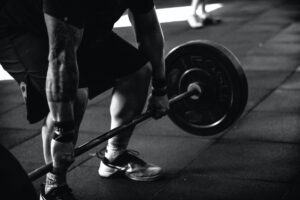Numerous fitness devotees aspire to rapidly and healthily gain muscle mass. It is crucial to remember that muscle gain requires time, dedication, and a balanced approach, despite the temptation to pursue immediate results. In this exhaustive guide, we will examine efficient strategies for gaining muscle while prioritizing overall health.
1. Establish Explicit Goals
Define your objectives before embarking on a muscle-building journey. Having specific, measurable goals will assist you in remaining motivated and monitoring your progress. Consider factors such as the quantity of muscle you wish to acquire, your desired body composition, and the time frame in which you hope to accomplish your objectives.
2. Develop a Well-Organized Workout Plan
A structured exercise program is essential for muscle gain. Concentrate on exercises like squats, deadlifts, bench presses, and rows that target major muscle groups. Include a combination of compound exercises that engage multiple muscle groups at once and isolation exercises that target specific muscles.
3. Progressive Exaggeration
Progressive excess is key if you want to build muscle. Gradually increase the resistance or weight that you lift over time to stimulate muscle growth. Increase the weight, the number of repetitions, or the number of sets in your exercises to ensure that you remain challenged.

4. Give precedence to compound movements
Compound movements, such as squats and deadlifts, recruit a higher number of muscle fibers, resulting in increased muscle activation and growth. Incorporate these exercises into your routine to maximize muscle gain.
5. Nutrition Is Important
Essential is a nutritious, muscle-building diet. Consume enough calories to support muscle growth, but prioritize nutrient-rich foods. Prioritize lean proteins such as chicken, fish, and lean beef, as well as plant-based proteins like containing tofu & legumes. Carbohydrates provide energy for exercise, while nutritious lipids promote general health.
6. Protein Ingestion
Protein is the primary component of muscle. Ensure you’re receiving enough high-quality protein in your diet to aid in muscle repair and growth. Daily protein intake should range between 1.2 and 2.2 grams per kilogram of body weight.
7. The Relationship Between Carbohydrates and Energy
Carbohydrates are necessary for fuelling exercises and replenishing glycogen stores in muscles. Opt for complex carbohydrates such as whole cereals, fruits, and vegetables to sustain energy for the long term.
8. Nutritious Fats
Avoid excluding beneficial lipids from your diet. Omega-3 fatty acids, which are found in foods such as fatty salmon and flaxseeds, have anti-inflammatory properties that aid in muscle recovery.
9. Maintain hydration
However, adequate hydration is crucial for muscle function and overall health. Dehydration can diminish performance and impede muscle growth. Consume copious amounts of water throughout the day, particularly before and after exercise.

10. Rest and Recuperation
Muscles require time to develop and repair. Ensure adequate rest, as the release of growth hormones occurs during profound sleep cycles. Aim for seven to nine hours of quality sleep per night. In addition, include recovery days in your training schedule to prevent overtraining and reduce injury risk.
11. Track Progress
Follow your progress with diligence. Maintain a workout log to document your exercises, weights, and reps. Take photos at regular intervals to visually track your physical progress. This information can assist you in making dietary and training adjustments as necessary.
12. Consider Supplements With Caution
While a well-balanced diet should provide the majority of essential nutrients, some individuals may benefit from taking supplements. Before adding supplements to your regimen, you should consult with a physician or registered dietitian. Common muscle-building supplements consist of protein powder, creatine, and branched-chain amino acids (BCAAs).
13. Remain Constant
Consistency is essential to any fitness endeavor. Even on days when motivation is low, adhere to your exercise and diet regimen. Results may not be instantaneous, but they will come with diligence and time.
14. Seek Qualified Counsel
Consider seeking guidance from a certified personal trainer or fitness coach if you’re new to weight training or have specific health concerns. They can assist in the creation of a personalized exercise program and ensure that you are performing exercises correctly and securely.

Conclusion
A well-rounded approach consisting of a structured exercise program, balanced nutrition, and sufficient recovery is necessary for gaining muscle rapidly and healthfully. Keep in mind that individual results may vary and that it is essential to prioritize your health and well-being throughout your muscle-building journey. You can accomplish your muscle gain objectives in a manner that promotes long-term health and fitness by adhering to these strategies and remaining dedicated.
- Are there any lifestyle changes you’re planning to make to support your weight gain goals?
If you enjoyed this blog post, share it with your friends!
